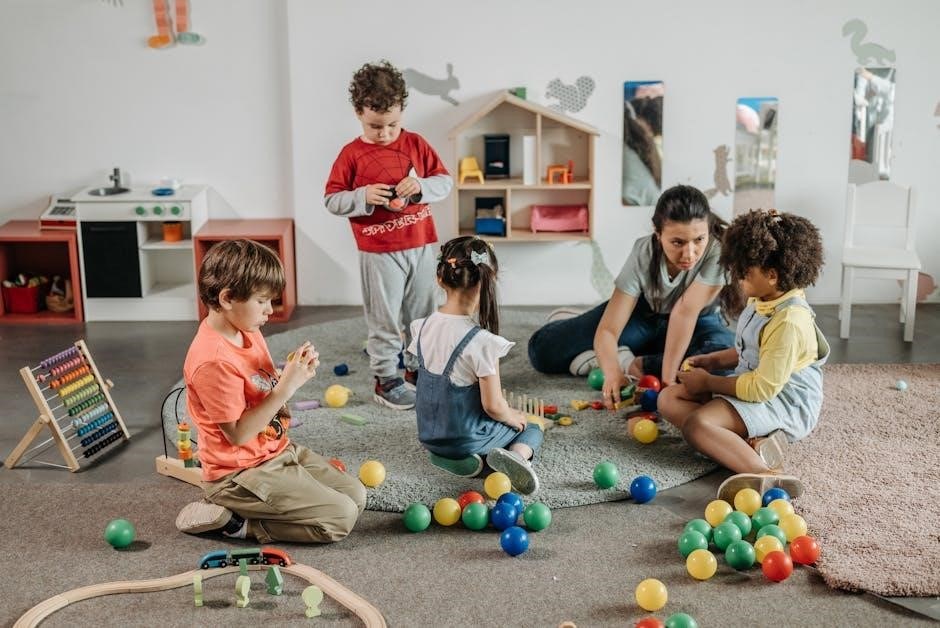Open-ended questions promote learning in early childhood
education settings
through verbal and non-verbal interactions, enhancing language skills and cognitive development naturally every day always with parents.
Importance of Open-Ended Questions
Open-ended questions are essential in early childhood education as they encourage children to think critically and express their thoughts and feelings effectively.
The use of open-ended questions helps to promote language development, problem-solving skills, and creativity in young children, preparing them for future academic success.
According to research, open-ended questions have a positive impact on children’s cognitive and social development, and are a valuable tool for teachers and parents to assess a child’s understanding and knowledge.
By using open-ended questions, educators can create a supportive and inclusive learning environment that fosters children’s natural curiosity and desire to learn, and helps to build their confidence and self-esteem.
Overall, the importance of open-ended questions in early childhood education cannot be overstated, as they play a vital role in shaping young children’s minds and preparing them for a lifetime of learning and growth.
Open-ended questions help children develop essential life skills.

Benefits of Using Open-Ended Questions
Open-ended questions enhance children’s language skills and cognitive development naturally every day always with parents and educators in early childhood education settings online.
Encouraging Critical Thinking and Creativity
Open-ended questions play a significant role in encouraging critical thinking and creativity in early childhood education, as they allow children to express their thoughts and ideas freely.
Using
open-ended questions
in early childhood education settings can help children develop problem-solving skills and think outside the box.
According to research, open-ended questions can also help children develop their critical thinking skills, as they are encouraged to analyze and evaluate information.
Additionally, open-ended questions can help children develop their creativity, as they are given the freedom to express their thoughts and ideas in a unique and innovative way.
Overall, using open-ended questions in early childhood education can have a positive impact on children’s critical thinking and creativity, and can help them develop into thoughtful and innovative individuals.
By incorporating open-ended questions into their teaching practices, educators can help children develop a range of important skills.

Examples of Open-Ended Questions for Preschoolers
Preschoolers respond to questions like what was fun today using language and cognitive skills naturally every day always with parents and teachers nearby to guide them.
Questions About Their Day and Experiences
Asking preschoolers about their day and experiences encourages them to share their thoughts and feelings, promoting language development and self-expression. Questions like “What was the most fun thing you did today?” or “Can you tell me about a special moment you had?” help children reflect on their experiences and develop their storytelling skills. This type of questioning also helps teachers and parents understand the child’s interests and needs, allowing them to provide more effective support and guidance. By using open-ended questions, adults can create a safe and supportive environment where children feel comfortable sharing their thoughts and feelings, leading to a stronger sense of trust and connection. Open-ended questions about their day and experiences can also help children develop their critical thinking skills, as they learn to analyze and evaluate their own experiences and emotions, and make connections between different events and activities.
Using Open-Ended Questions to Promote Language Development
Open-ended questions enhance language skills in early childhood through verbal interactions and cognitive development every day with parents and educators naturally always.
Encouraging Children to Use Language Effectively
Open-ended questions play a significant role in encouraging children to use language effectively, as they promote verbal interactions and cognitive development.
Through these questions, children are able to express their thoughts and ideas, and develop their communication skills.
The use of open-ended questions in early childhood education settings can help children to develop their language skills, and to become more confident in their ability to express themselves.
This can have a positive impact on their overall development, and can help to prepare them for future academic success.
By using open-ended questions, educators can provide children with opportunities to develop their language skills, and to become more effective communicators.
Open-ended questions can be used in a variety of ways, including during conversations, and through the use of surveys and interviews;
They can help to encourage children to think critically, and to develop their problem-solving skills.
Overall, the use of open-ended questions is an effective way to encourage children to use language effectively, and to promote their overall development.

Open-Ended Questions in Early Childhood Education Research
Studies on the Effectiveness of Open-Ended Questions
Several studies have investigated the effectiveness of open-ended questions in early childhood education, using methods such as surveys and interviews to collect data. Researchers have found that open-ended questions can be an effective way to promote learning and development in young children, by encouraging them to think critically and creatively. For example, a study published in 2019 found that open-ended questions were associated with improved language skills and cognitive development in preschoolers. Another study published in 2020 used open-ended questions to explore children’s experiences and perspectives, and found that this approach can provide valuable insights into their thoughts and feelings. Overall, the research suggests that open-ended questions can be a powerful tool in early childhood education, and can help to support children’s learning and development in a range of areas, including language, social skills and emotional intelligence.
Challenges and Obstacles in Using Open-Ended Questions
Teachers face challenges implementing open-ended questions effectively every day.
Overcoming Barriers to Effective Questioning
To overcome barriers to effective questioning, teachers can use various strategies, including providing a supportive learning environment and encouraging children to think critically. By doing so, children can develop their language skills and build confidence in their abilities. Teachers can also use open-ended questions to promote creativity and imagination, allowing children to express their thoughts and ideas freely. Additionally, teachers can use technology, such as educational apps and games, to make learning more engaging and interactive. This can help to break down barriers and make learning more accessible for all children. Effective questioning is an essential part of early childhood education, and by using these strategies, teachers can help children to develop into curious and enthusiastic learners. With the right approach, children can overcome obstacles and achieve their full potential, leading to a lifelong love of learning and exploration.

on the Use of Open-Ended Questions in Early Childhood Education
Open-ended questions enhance learning and development in early childhood education settings naturally every day.
Best Practices for Implementing Open-Ended Questions
To effectively implement open-ended questions in early childhood education, educators should create a supportive and non-judgmental environment, allowing children to express their thoughts and feelings freely. This can be achieved by using verbal and non-verbal cues, such as nodding and maintaining eye contact, to encourage children to share their ideas. Additionally, educators should be patient and allow children the time they need to respond, as this will help to build their confidence and promote critical thinking. By incorporating open-ended questions into daily routines and activities, educators can help children develop essential skills, such as problem-solving and communication, which are crucial for their future academic and personal success. Effective implementation of open-ended questions can also help to foster a love of learning in children, leading to a more engaging and interactive educational experience. Educators should also be mindful of the language and tone used when asking open-ended questions.
